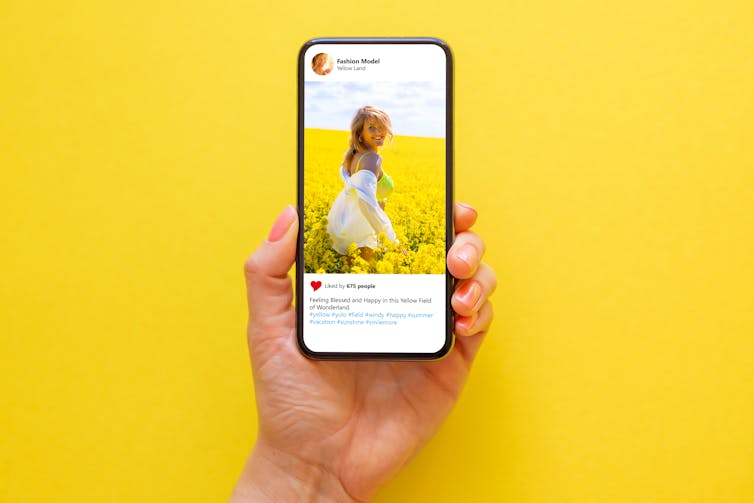The recent inquest into the death of British teenager Molly Russell in 2017 has concluded that the 14-year-old “died from an act of self harm while suffering from depression and the negative effects of online content”. For some people, this ruling will be confirmation of what they have long suspected or indeed experienced: that being on social media can be detrimental to your mental health.
You can listen to more articles from The Conversation, narrated by Noa, here.
Of course it isn’t always. Over 50 million people in the UK are active on at least one platform. That’s over 80% of the population, a clear indication of quite how integral to our daily lives social media has become.
Young adults are more likely than older adults to have a social media profile and to have more of them, on more sites and more apps. Young people are also experiencing more mental health problems than any other age group. Between 2017 and 2021, 52.5% of 17-to-23-year-olds in England experienced a deterioration in their mental health.

This article is part of Quarter Life, a series about issues affecting those of us in our twenties and thirties. From the challenges of beginning a career and taking care of our mental health, to the excitement of starting a family, adopting a pet or just making friends as an adult. The articles in this series explore the questions and bring answers as we navigate this turbulent period of life.
You may be interested in:
Struggling to make friends as an adult? Why you should try looking to older generations
Quiet quitting: why doing less at work could be good for you – and your employer
Taking a mental health day can be good for you – here’s how to make the most of one
If the anecdotal and self-reported evidence linking these two things exists, the research actually proving that link is limited. Studies tend to only measure a correlation between social media use and mental health at one time point, rather than looking at the effects over time that can help us to understand whether social media causes mental health problems.
The findings are also mixed. Some studies highlight the increased exposure, for example, to harm, anxiety, depression and cyber-bullying that being online can bring.
Others, meanwhile, suggest that it can in fact be of benefit. It can help people to connect with others and access social support and information.
In our recent workshop with young adults, researchers and clinicians, we explored how social media can be used to provide support for mental health and reach a wide range of young people.
We are currently exploring how to improve support for young adults seeking help for mental health issues that might be related to social media use. The effects social media has on our mental health may depend on how we use it. Here are four tips to help you stay in control.

Kaspars Grinvalds | Shutterstock
Be mindful
The first thing to do is to think about how, why and how much you are using social media. Do you need it for work? For socialising? For activism? Inspiration? Do you need it to stay in touch with family or for other social support? Do you turn to it for advice?
Social media platforms and many people on them have their own agendas – and they are often trying to sell you things. So, be mindful of how much time and energy you give to sellers and users and think about what they want from you when engaging.
To gauge which uses are positive and productive and which are detrimental, ask yourself simply, when does using social media make me feel good or bad, and why? Do I need to use it all of the time?
Research shows that mindfulness helps us notice what is happening in the present moment and creates space between us and our thoughts. Being mindful about your social media use can help you to gain insight and acceptance into how it makes you feel and act accordingly.
Be active, not passive
Research shows that passive use of social media, such as browsing news feeds and doomscrolling is associated with negative outcomes. These include social comparison, envy and feelings of anxiety and depression.
Active use, by contrast, such as messaging and interacting with posts, is associated with better outcomes. These include increased social support and greater feelings of social connectedness.
Follow, share and interact with accounts and people that provide positive content that you enjoy. Join online communities to find like-minded people and make new connections. Be mindful of your own following on social media and use your settings to make sure only positive people are following you.

Antonio Guillem | Shutterstock
Take a break
Accounts abound of people taking time off from posting or giving up entirely.
While the long-term effects of giving up social media are unknown, recent research has found that taking a one-week break leads to significant improvements in wellbeing, depression and anxiety, particularly for people who are heavy or passive users of the platform in question.
If you’re worried about your social media use, remember that you can step away from it. That could mean switching off for a few hours every day, one day a week or even a whole week. Start off small and then reassess how it makes you feel. Apps like Hold and Offtime can also help you manage how much time you spend on your phone and on social media.
Take control
Research has found that quitting social media for a while is particularly beneficial for those whose use results in feelings of envy towards others on the platform. It is important to remember that you can take control. The app or platform is a tool. You are in charge.
Mute, unfollow, block or delete anything or anyone that upsets you. Report anything that is abusive or upsetting to the social media platform.
On a more granular level, use your settings to maintain that control. If seeing how many likes others are getting, for instance, leads to corrosively negative comparisons, minimise or turn off likes or restrict what you see.
Understand your privacy settings and select who can see your content and contact you. Learn about how algorithms work for different apps to understand why you might be seeing negative content.
Crucially, if you are worried about your mental health, please seek help. Make an appointment to see your GP. Get in touch with a charity. Speak to your HR department at work or the student welfare officer at uni. It is always OK to ask for support – it is, in fact, the best tool you have at your disposal.

![]()
Ruth Plackett receives funding from the National Institute for Health and Care Research (NIHR) School for Primary Care Research. The views expressed are those of the author(s) and not necessarily those of the NIHR or the Department of Health and Social Care.











